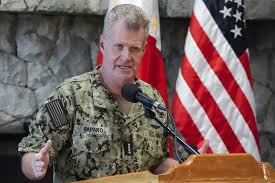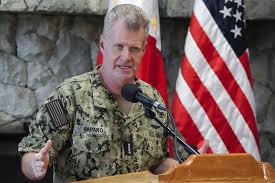
A senior U.S. military official warned his Chinese counterpart in a significant diplomatic exchange. The talks, the first of their kind between the commanders, focused on Beijing’s actions in the South China Sea. Admiral Samuel Paparo urged the People’s Liberation Army (PLA) to reconsider its dangerous and coercive tactics. These maneuvers, he stressed, are potentially escalatory.
The meeting highlighted growing tensions in the region. The South China Sea remains a crucial and contested area. Both nations have vested interests, and their military activities have frequently clashed—consequently, the dialogue aimed to address these issues and reduce the risk of conflict. However, the challenges remain significant.
Admiral Paparo emphasized the importance of maintaining peace and stability during the talks. He expressed concerns over China’s aggressive posturing. These moves, he argued, threaten regional security and undermine international norms. Moreover, the potential for escalation could lead to unintended consequences.
Transitioning to a more conciliatory tone, Paparo encouraged open communication. He stressed that dialogue is crucial in preventing misunderstandings. By fostering transparency, both nations could work towards mutual understanding. Nevertheless, the path to achieving this remains fraught with difficulty.
China’s presence in the South China Sea has grown markedly. The construction of artificial islands and military installations has raised alarm. According to the U.S., these actions are part of a broader strategy to assert dominance. Thus, Paparo’s warning is timely, reflecting Washington’s deepening concerns.
Despite these tensions, there is hope for progress. The talks signify a willingness to engage, albeit cautiously. Both sides recognize the high stakes involved. Therefore, continued dialogue is essential. It offers a platform to address grievances and explore potential solutions.
However, the complexity of the situation must be addressed. The South China Sea is a strategic waterway vital for global trade. Any disruption could have far-reaching implications. Hence, careful navigation of diplomatic and military channels is paramount.
In addition to urging restraint, Paparo highlighted the benefits of cooperation. By working together, both nations could enhance regional stability. This approach, he suggested, would serve the interests of all parties involved. Yet, achieving this requires significant effort and compromise.
Ultimately, the talks underscore the delicate balance of power in the region. The U.S. remains committed to upholding international law and ensuring freedom of navigation. Meanwhile, China continues to assert its claims, leading to ongoing friction. The outcome of these discussions could shape future interactions.
Admiral Paparo’s warning to China marks a critical moment in U.S.-China relations. By addressing Beijing’s actions in the South China Sea, the U.S. aims to prevent potential conflicts. The emphasis on dialogue and cooperation offers a path forward. However, the challenges are considerable, requiring sustained engagement and mutual restraint. As the situation evolves, both nations must navigate this complex landscape with care and precision.




